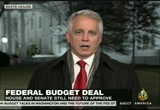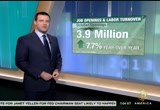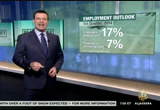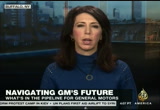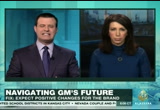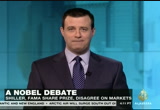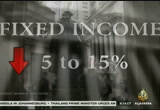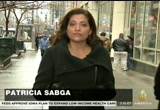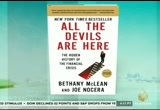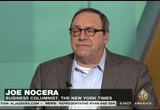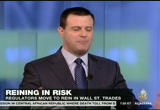tv Real Money With Ali Velshi Al Jazeera December 10, 2013 7:00pm-7:31pm EST
7:00 pm
>> this is al jazeera america live from new york city. a look at today's top stories. congress has reached a budget deal, lawmakers within the hour. they have agreed to a two-year agreement which would avoid a government shutdown this month. and tens of thousands of people brave the rain storms to pay tribute to nelson mandela. president obama spoke at the memorial. john pedesto will become counselocounselor to the presid.
7:01 pm
the control kerr rule is now in place. federal regulators approved the guidelines that keep banks from making risky investments. a milestone in the auto industry, general motors named mary bar ra as their next ceo. making her the first female ceo of an automaker. "real money with ali velshi" is next. >> if you're looking for a new job, now is the time to jump. we will show you why. plus running the company, general motors has made history to name as ceo the first woman
7:02 pm
to lead one of the big three automakers. i'm david shuster in for ali velshi who is in had south africa. this is real money. >> this is rea "real money" andu are the most important part of the show. we have news from capitol hill. the federal budget deal, if approved by the republican-head house and democratically led senate it will will another government shutdown in january and that stability would be very good news for our economy. what is in the deal and what is not in the deal? >> david, the first thing you should know about this deal is that it's not a done deal in
7:03 pm
terms the house and senate, and it remains to be seen whether conservatives and liberals will get on board. there is enough for them to hate. the biggest news out of this deal, that they're able to make any kind of deal at all given everything that has happened before. after washington dysfunctioned time and time again has led to the shutdown and crises over the debt ceiling. it's 12 trillion-dollar deal over two years. two-year deal. normally the budget cycle in washington is one year. and this will give businesses both large and small an opportunity to be free of those washington head winds and everything that the agreed lock has engendered here in terms of tripping up the economy. it reduces the sequester by some $63 billion over those two years. that has stuck in the craw of many democrats and republicans alikrepublicans alik alike an -a
7:04 pm
parties also against it. president obama now now come back from south africa. he'll be praising it. it will be on the house floor thursday afternoon. >> it's so interesting to see a surrender because no changes in tax policies, no changes in social programs. mike viqueira, thank you. we appreciate it. we learn that america's job outlook could soon be headed towards a big jolt. that's according to the biggest jobs report coming out of the labor department. a 7.7% jump compared to the same month last year and the largest number of the jobs advertised in five years. to suggest that after years of caution are finally in a mood to
7:05 pm
expand. there are more signs of healthy churning in the labor mark. the amount of job turn overs rows 4.2% gain over the previous year. that includes an increase in the number of people who are voluntarily leaving their jobs to check out better prospects elsewhere. more hiring, more leaving their current position all add to the job numbers. and the unemployment rate falling to 7%, the lowest level in five years. looking ahead, manpower group, a recruiting firm that conducts a quarterly survey nationwide said employer optimism has pushed its employment level to the highest level in five years. 17% of employers say that they intend to hire more staff in the first three months of 2014.
7:06 pm
another 7% said they plan to reduce staff and the remaining three-quartered surveyed said they intend to keep staff levels where they are or they're not sure about their plans. the biggest hiring gains will be seen at the lower end of the scale in leisure and hospitality jobs, but hiring will pick up up thhire end of the scale. manpower survey found that staffing levels should remain relatively stable going into 2014. at one big manufacture today we got news of of groundbreaking hire of sorts, promotion mary bara the next ceo of general motors. a long-time executive at gm will be the first woman to head one of the big three automakers. she'll replace daniel ackerson, and her career at g.m. began as
7:07 pm
as student intern at age 18. she's widely credited for the successful roll out of two new pickup truck and changes to cars including the corvette and chevrolet impala which earned a top rating from consumer reports. this announcement from g.m. came one day after the u.s. treasury closed the book on the bail out, and both of these moves could fuel g.'s success moving forward. lauren the founder of automotive aspects and has studied the auto industry as a reporter and a road racer, your reaction to this news. >> the whole auto industry is excited to have the first female in charge of the a global auto manufacturer. she has literally broken the glass ceiling. surprisingly this has not happened in the past. we're excited to see what she
7:08 pm
can do with the corvette, impala and other products she has been involved in. i think g.m. will have great products coming down the road. >> lauren, what has been the success to g.m. in the last years? >> i think think the products. after they take the bailout a lot of people got discouraged in the brand, and now they're bringing those buyers back based on new designs, new technologies, making cars that people want to buy. and i think that's a big part of what g.m. has done especially with the cadillac and buick line up. >> a big part of what their experience is, to turn around g.m. i think their model replacement saw 28% of the entire fleet can be turned around with new design in one year. that's pretty amazing, and she's right there with all of that, right? >> absolutely. and remember she worked her way up through production. she wasn't just somebody who came from another industry, who was placed here. she worked in production.
7:09 pm
her father worked for the pontiac division, which is cool. she is a second generation g.m. worker. she went to gmi, which is no longer called gm institute. she's very sharp. she's very smart. she has teenage boys, she's getting information from the millennial marketplace and the baby boomers and jen x. i would not necessarily jump in and buy the stock, but i think we have positive things coming our way. >> how difficult is it to say redesign corvette or impala to be right there for it to be successful. >> it will take a couple of years. it's not someone just drawing it up and then saying, yeah, let's have do that. there has have wind tunnel testing, production has to be produced, and she's involved in the production side.
7:10 pm
which is very unusual. she even worked in human resources which is very good when you have to work with the unions. the uaw has got to like her, too. >> lauren, finally, several women occupy executive position at general motors. tell us about that. >> there are a lot of women who are up and coming in a lot of manufacturing companies, and big for gm and for ford and chrysler to do this because women make 85% of the buying and maintenance decisions. we own 60% of the cars on the road. volvo has been doing that for years. when you get a different personality bringing females who are making decisions we're not talking about silly things like lit vanity mirrors. we're talking about the look, the aerodynamics how things look to the driver, seating comfort those are critical factors. that's what makes people buy your brand. >> thanks for joining us. we appreciate it. here is a great way to liven
7:11 pm
up a humdrum nobel prize weekend in sweden and american economists with wildly different views of how finances work and let memor them debate. they collected their prized today, they disagree on whether markets are rational and predictable. one says yes, the other says no and made a name for themselves by calling different market bubbles. schille said in sweden that fama may have cognitive di dissonanc. we now know it's not contradictory to win a nobel prize and take a few shots at the person who also won the award. it's that time when main street hates wall street, who is laughing all the way to the bank, and it's not the usual
7:12 pm
7:13 pm
>> it's official. banks will no longer be allowed to make risky trades. today they called the volcker rule that keeps banks from engaging in proprietary trading. it will change the culture on wall street that contributed to risky investments. it also attempts to protect main street by requiring banks that include pay packages that do not reward risky trading. and this is the time of year when pay reaches wall street. we have now reached bonus season. bonuses are expected to rise 5% on average, but jobs involving
7:14 pm
big risk which used to pay the most are no longer reaping the biggest reward. we have the story. >> reporter: it's the big payday that fattens wallets on wall street and fuels the ire of main street. year end bonuses can comprise up to 80% of wall street pay packages. this season payouts are expected to rise for the second year running but the spoils won't be shared equally. a tepid deal climate include firms who advice on mergers and acquisitions are expected to be 5% than last year. the biggest losers are bond traders. their bonuses are expected to fall 5% to 15% thanks to interest rates and wrong bets on when the feds would pull back on the economic stimulus. >> the big income traders, they
7:15 pm
guessed it wrong. >> reporter: alan johnson produces a closely watched survey of wall street compensation. according to him low risk steady generators are this year's bonus winners and should enjoy a 10% bump. >> investment banks were the highest paying firms but we've had a change, mutual funds and other things that paid at least as well if not more and that trend is likely to continue. >> reporter: while market conditions are rewarding lower risk activities regulators have also tried to force change on wall street. strong arming banks to tie executive compensation to performance. >> regulators hope to discounselor the type of short-term risk taking that many believe caused the financial crisis. ironically. it could bring more outrage on
7:16 pm
main street because it has some banks looking at huge payouts. jamijamiejamie dimon's package s awarded now $24 million, but it's now worth $18 million thanks to a gain in the stock price. the same year that the bank was slapped with a record record billion dollars fine. some believe the best way to drive more responsible behavior is to change how bonuses are calculate glad most of your bonuses when calculating your bonus you're looking at what profit did you make for the firm and 10% you'll get for your compensation. here the idea is don't just look at how much profit you made, but how much risk did you take on behalf of the firm. how much risk did you expose the firm to in your activities. >> last year average salary for financial securities employee in new york was $360,000.
7:17 pm
that is five times higher than other for-profit businesses. today on twitter and facebook we've been asking you how can wall street compensation about given responsibility. >> and another says, some how tie their performance in job creation in the private sector. tell us what you think @aj real money or on facebook. we have a book about the financial crisis, and we're joined now in studio, jamie dimon gets $18 million in bonus money, the same year that they're fined $13 billion. how is that possible?
7:18 pm
>> they still made a profit. the real issue is not the ceo payable that is important. the real issue is how much are the traders getting paid, and what is the basis for that pay? before today, before the volcker rule was approved the more risk you took and the more money you made, the more you would get to take home. presumably with the rules of the volcker rule now different things will be valued. client relationships, what do you do--how much concentrating do you "z" do you for for client as opposed how much did you do for the firm. >> there is still this culture embedded in wall street even now with this rule that says, it's fine to risk other people's money. if you lose maybe you lose your job but that's about it. >> reporter: well >> well, that's true.
7:19 pm
excuse me. >> that's okay. are you suggesting that the volcker rule is a good first step? >> i think the volcker rule, the problem with it is that it does it go too far or doesn't it go go far, the problem with it is it's extremely complicated. it's hard to tell if you do it for your client or if you do it for yourself. and if the regulators decide two or three years from now if they're going to be as tough. >> and it looks like the regulators are not going to be tough at all and it's something that is very difficult to enforce. >> i'm not 100% sure that's right. i think the regulators over the past year in the time after the london whale trade of jp morgan, the one that cost them so much money, i think it's the way they're treating banks. i think they're going to be tough. >> look, tie the bonuses tha toe
7:20 pm
jobs created in the private sector. >> the problem on wall street they say they're about creating jobs but they're about creating money for themselves. >> and trading paper. >> the era when wall street cared about job creation and the rest of the country is long gone. and the truth of the matter the reason why they want to make so much money is a person who goes on to wall streets not doing it forral truestic reasons. they are doing it because they want to maximize the money that they make. >> is there something that the rest of society or government can do to change this? okay, you can have as much of a bonus that you deserve if you're creating jobs as opposed to the largest amount of paper that you're tradingen. >> i think it's a middle point. i don't think you can gauge the amount of jobs that you create on wall treat, but i think there
7:21 pm
is is point in between where you're valued on your client relationship and the things you do for client which is what wall treat is supposed to be doing any way. >> thank you for coming in. >> thank you for having hey. >> ali velshi talks to a local vendor about the post apartheid economy when "real money" continues.
7:22 pm
7:23 pm
are we using outdated models to measure success. >> that's "the stream" right after "real money." >> the elite and ordinary gathered together in johannesburg to pay tribute to nelson mandela. in an economy dominated by large companies, only 35% of south africans believe there are opportunities business opportunities in the country. it may be related to the fact that small businesses in south africa have one of the highest
7:24 pm
7:25 pm
and you have been selling this all day. how is business? >> business is good today. very, very good. >> you have not been doing this this. this is new business for. >> you it's not a new business. eight months i've been doing this line. >> before this you were a waitress. >> i decided to tart my own business. >> how is it for people who want to start their own business in in aparin apartheid south afric. is it easy or hard. >> it's a gamble. sometimes you win, sometimes you lose. >> do you think the economy is better now after apartheid than before? >> i would say so, yeah. it is better now because a lot of things are better now. it's easier to open a shop.
7:26 pm
everything is nice. >> so you have a better chance now. up. >> they're all buying. >> let me say that. he's making that, tell me what that is. >> it's chicken and rice. >> what is the most typical thing if i wanted to get a typical meal. >> pop and steak. you don't need to make it fancy. you're going to give me pop. and your supposed to eat it with your hands. and give me a piece of stake. never mind the vegetables. well done. well done. i want to stay healthy.
7:27 pm
do i eat this separately, and how much is this. >> $4. there. >> this is the main meal for the day? >> this is the main meal for the day. >> what time do people eat this? >> around 12. >> so lunch. they sit and take take little bit like this? we'll try a piece of this stake. and what kind of meet it this? >> beef. >> absolutely delicious. some thing don't change. people have to eat. i'm ali velshi, al jazeera. >> another thing that doesn't change, no vegetables, just steak. well done. how can wall street compensation be designed to encourage performance and responsibility?
7:28 pm
you can tweet us @ali velshi or leave us a comment on our facebook page. if you want to see more on tonight's stories log log on our website at www.aljazeera.com. another cautionary note about football, many are encouraged to take out a loan to follow the school football game. paying back $2,000 at 6.9%, the best rate offered means you will owe $118 every month for a year and a half. it's money you might otherwise spend on monthly school expenses or maybe even frosty adult beverages. also if you don't pay back the loan as schedule your post college finances will be muddied
7:29 pm
with lousy credit a rating. from one big fan to another don't let any bank. induce your school spirit by getting a loan you want afford. don't worry about watching it on television. it will be just as great if they win or feel just as awful if they lose. trust me, i'm a michigan grad. we'll look at big business, whether or not you follow football, you don't want to miss our report. i'm david shuster in for ali velshi. thanks for joining us.
7:30 pm
130 Views
IN COLLECTIONS
Al Jazeera America Television Archive
Television Archive  Television Archive News Search Service
Television Archive News Search Service  The Chin Grimes TV News Archive
The Chin Grimes TV News Archive 
Uploaded by TV Archive on

 Live Music Archive
Live Music Archive Librivox Free Audio
Librivox Free Audio Metropolitan Museum
Metropolitan Museum Cleveland Museum of Art
Cleveland Museum of Art Internet Arcade
Internet Arcade Console Living Room
Console Living Room Books to Borrow
Books to Borrow Open Library
Open Library TV News
TV News Understanding 9/11
Understanding 9/11



